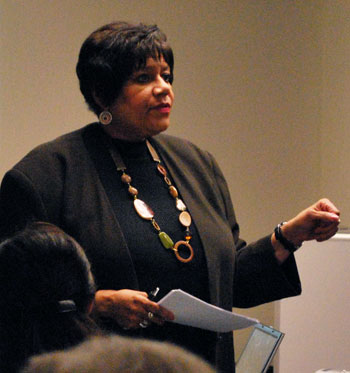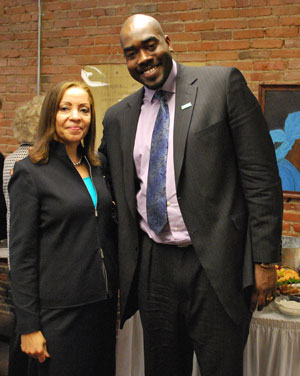“Obama Bucks” Boost Eastern Washtenaw
On Friday, May 8, the renovated Ypsilanti storefront that houses SPARK East will be open to the public for a look at the business services offered there. The event is part of a larger economic development effort on Washtenaw County’s east side, an effort that’s getting a boost from federal stimulus funding – or what one county official called “Obama bucks.”
Last Thursday, about 40 members of the Eastern Leaders Group got an overview of the 2009 Recovery and Reinvestment Rapid Response Strategy Business Plan, which had been approved by the ELG executive committee in mid-April. Held at the brick-walled SPARK East office on Michigan Avenue, the meeting covered a lot of ground, from neighborhood revitalization efforts to a plan for microloans to businesses.
The Chronicle dropped by to hear about the plan too. Though the meeting was decidedly forward looking, there was an element of history at SPARK East as well – more on that later. We’ll start with a look at the three main topics covered on Thursday: 1) business development and employee training, 2) microloan programs, and 3) community revitalization and stabilization plans.
David Behen, deputy county administrator, introduced the presentation by listing some concrete things the Eastern Leaders Group had done, a list that included helping to open SPARK East. Last year activity slowed down, he said, but when federal stimulus dollars became available, that provided an opportunity to act.
He noted that when the ELG steering committee met on April 14 to vote on the plan being presented to the group that evening, the person who made the motion was Peter Fletcher. (Fletcher is a longtime Ypsilanti businessman, a Republican stalwart and an erudite man not known for mincing words.) “He’s someone who makes sure it’s right before he’s behind it,” Behen said. “Well, he’s behind it.”
Business Development & Employee Training
Diane Keller, president of the Ypsilanti Area Chamber of Commerce, started off the discussion about business development by noting that nearly all the services that any business would need are available within a two-block area of downtown Ypsilanti. She ticked off a few of those: Eastern Michigan University’s College of Business and its Center for Entrepreneurship, the chamber, SPARK East, Congressman John Dingell’s office, the Michigan Small Business & Technology Development Center, the Ypsilanti Export Assistance Center and others.
The idea is to bring these groups together in a “mega” partnership, Keller said, with the goal of creating or retaining 25-30 businesses, creating 250-300 new jobs, and training 200-400 people. The partnership could provide customized job training, marketing and technical assistance, microloans and referrals to other federal, state or local resources, she said.

Trenda Rusher, director of the county's Employment Training and Community Services (ETCS) department.
At that point, Trenda Rusher, director of the county’s Employment Training and Community Services (ETCS) department, took over the presentation and outlined the industries for which job training will be prioritized. Among them are “green” industries like alternative energy or environmentally friendly construction, medical/life sciences, telecom, and companies focused on electrification (such as the development of batteries for vehicles). High-skilled, high-wage, high-demand industries will also be a priority, she said.
Also in the ELG plan is a Center for Transitional Talent, which will provide retraining and other services to executives, middle managers, dislocated workers and retirees who are returning to the workforce. Programs could include paid internships and apprenticeships.
Yet another program will focus on training and jobs for youth from ages 14-24 years old, Rusher said. Partners include EMU’s Early College Alliance and the Business Side of Youth, another EMU program.
Microloans
Skip Simms, managing director of Ann Arbor SPARK’s business accelerator and manager of the Michigan Pre-Seed Capital Fund, gave an overview of a microloan program that’s part of the strategic plan for eastern Washtenaw. The goal, he said, is to provide funding for small businesses as well as startups founded by people who took early retirement or buyout offers. The county is planning to provide about $200,000 to fund these programs.
There are two components. One fund, managed by the Center for Empowerment & Economic Development (CEED), will provide small loans to businesses that are having cash-flow problems and that perhaps can’t get a line of credit. These microloans could be leveraged to bring in additional dollars from the U.S. Small Business Administration (SBA), which could potentially provide 7-to-1 matching funds.
A second fund, managed by Ann Arbor SPARK, will target companies with global markets and the potential for high growth, Simms said. That means the loans – capped at $50,000 – would be high risk, he said, but “the opportunity is huge.” The goal is to create 185 jobs within two years.
Community Revitalization & Stabilization
Mary Jo Callan, director of the city/county office of community development, said that economic development goes hand-in-hand with neighborhood revitalization, and she described several programs in the latter category.
Ongoing community development programs in the county aim to assist low- and moderate-income residents find and maintain housing, she said. Her department also funds community projects designed to improve the quality of life for residents. (The department’s website gives examples of improvements to parks in Ypsilanti Township and sidewalks in Salem Township.) They’re spending about $1 million annually on the eastern side of the county, Callan said.
Callan also described a new federal program to fund neighborhoods hit hard by foreclosures. All of the $3 million in funding will be used on the east side of the county – in Ypsilanti, Ypsilanti Township and Superior Township. [See previous Chronicle coverage of the program here.] Separately, the county hopes to find funding sources for improving the housing stock around the Eastern Michigan University campus.
Washtenaw County is also getting $4.1 million to help weatherize homes of low- to moderate-income residents, Callan said. A large part of that federal Recovery Act grant will be used on the eastern side of the county, she said, and will result in a triple bottom line: 1) homeowners save money on their utility bills, 2) the county creates “green” jobs related to weatherization and possible alternative energy initiatives, and 3) the program ultimately helps the environment by reducing the amount of energy used.
Callan described two other initiatives: a land bank being formed by the county treasurer’s office that will buy, redevelop and resell residential or commercial properties that had been abandoned or foreclosed on, and 2) energy efficiency and conservation block grants (EECBG), which can be used by homeowners or businesses. The county is getting $750,000 through these grants – Callan said one possibility might be to start a revolving loan fund that people could tap to make energy efficiency improvements.

Deputy county administrator Verna McDaniel and Shamar Herron, manager of SPARK East, at a reception following the April 30 meeting of the Eastern Leaders Group.
Next Steps
After the presentation, deputy county administrator David Behen urged ELG members to sign up for specific “action teams” focused on the areas that had been discussed. The roughly $8 million in federal dollars that’s funding many of these programs must be spent within 18 months, he noted. But the point is that they now have the funding to be successful, he said: “That’s something that should get this room excited.”
The plan will be officially launched at a June 2 breakfast hosted by the Ypsilanti chamber, and Behen said they planned to promote the initiative in print, TV, radio and online. He told the group: “We’re gonna get this done this time.”
Friday’s open house at SPARK East, 215 W. Michigan Ave. in Ypsilanti, runs from 1:30 to 8 p.m. Tours of the facility will be held from 1:30 to 5 p.m., with a ribbon cutting to take place at 2:30 p.m.
One Final Note: Peeling Back History
In the lobby of SPARK East is a section of plaster covered with plexiglass. It stands out because the rest of the walls are exposed bricks, mostly covered with artwork. There’s a story about that piece of plaster, which is pictured at the beginning of this article. A close-up is shown below.
There were actually several layers of plaster on the walls that workers removed to expose the bricks. As they stripped away one section, they found that workers in November, 1941 – who were also doing remodeling work in the building – had signed their names lightly on the wall. So the section was left up, signed and dated by workers who did the current remodel, to connect the present to the past in one small way.






Great article!! Good information to know… thinking of starting my own business and didn’t realize how much info there is and help out there for me… Will definitely check out the federal SBA microloan program and SBTDC for the couseling…. Thanks for passing this along…